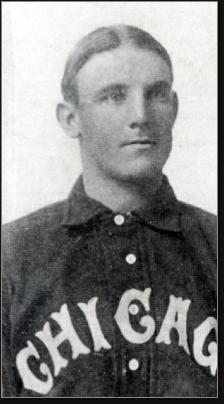
Sport: Baseball
Born: November 6, 1876
Died: November 9, 1914
Town: Burlington, New Jersey
Edward “Danny” Green was born November 6, 1876 in Burlington, NJ. Danny played semipro ball in South Jersey as a teenager and distinguished himself as a fine hitter and aggressive—albeit often imprudent—base runner. His lone, glaring weakness was his throwing arm; rivals took great liberties with it throughout his career.
Danny signed his for professional contract at 19 and played in the minors in Pennsylvania and Massachusetts for several years. In 1898, his contract was purchased at mid-season by the Chicago Orphans of the National League. The team had been called the Colts the year before, but were renamed after they lost Pop Anson to retirement over the winter. They would become the Cubs in 1903.
Danny was one of the youngest players in the league, but he had one of the most daunting jobs—to replace Bill Lange, Chicago’s greatest star. Lange was marrying a society woman whose family did not feel baseball was a suitable profession. Danny batted over .290 in all four of his seasons with the Orphans and was among the team leaders in runs scored and stolen bases.
In 1901, the American League began play and set up a rival team in Chicago, the White Sox. Danny was offered a big raise to jump leagues in 1902 and he did. He was one of the top all-around players for the White Sox over the next few years. An injury to Danny’s already weak throwing arm limited his playing time in 1905, contributing to the team’s disappointing finish, just two games behind the pennant-winning Athletics.
As it turned out, 1905 was Danny’s last year as a big-leaguer. In the spring of 1906, owner Charles Comiskey toyed with the idea of keeping him on as a player-coach and put him in charge of half the team. Danny had his players roller-skating instead of jogging , and explored some other unusual training ideas. Comiskey sent him to the minors before the season began. Chicago went on to win the pennant without him that fall.
Danny tried to extend his career with several minor-league teams in the Midwest. He led the American Association in runs scored in 1906 and 1907. A serious beaning appears to have affected his motor skills and ended his playing career. Coupled with the earlier death of his wife and increasingly heavy drinking, Danny’s misfortune eventually landed him in a sanitarium, where he died at the age of 32. Some claim that a case of syphilis precipitated his demise. Obituaries only referred to an old baseball injury.